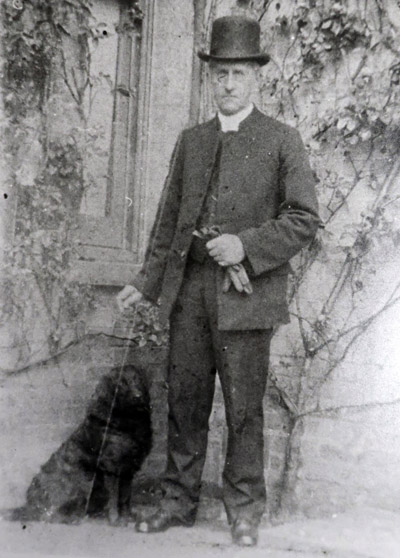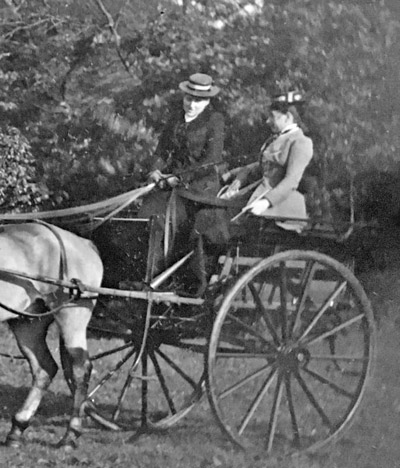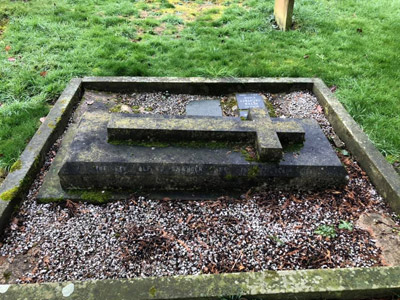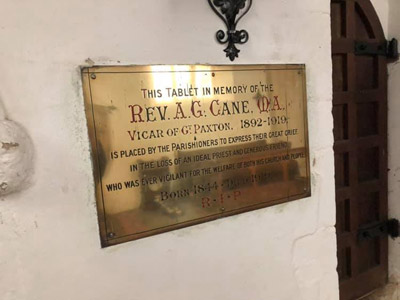Rev. Alfred Granger Cane, 1844 - 1919
Great Paxtonians
A series of articles about people who have lived in Great Paxton or have a connection with the village.
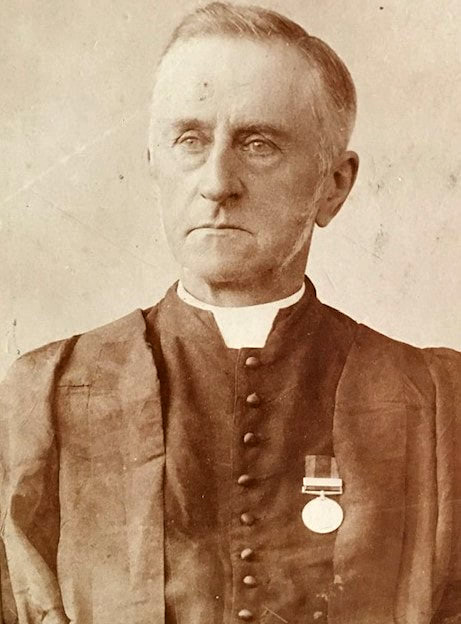 Rev
Cane, known as Toby to his family, was born at Brackenhurst
Hall, Southwell, Nottinghamshire, the ninth son of Rev Thomas
Coats Cane, and mother Mary, one of 13 children. The impressive
Hall is now owned by Nottingham Trent University. Alfred studied
at St John’s College, Cambridge and was awarded a BA in 1867
and MA in 1870. He was deaconed in 1867 and priested in 1868
at Lincoln Cathedral.
Rev
Cane, known as Toby to his family, was born at Brackenhurst
Hall, Southwell, Nottinghamshire, the ninth son of Rev Thomas
Coats Cane, and mother Mary, one of 13 children. The impressive
Hall is now owned by Nottingham Trent University. Alfred studied
at St John’s College, Cambridge and was awarded a BA in 1867
and MA in 1870. He was deaconed in 1867 and priested in 1868
at Lincoln Cathedral.
After serving as a curate (an assistant to a vicar) in Lincoln from 1867-1871, Cane became an army chaplain in India in 1871 serving for over 20 years until 1892. He joined the Indian Ecclesiastical Establishment, a branch of the Government of India, members were deployed as garrison chaplains in towns.
In the latter part of 1878, the second Afghan War broke out and in early 1880 Cane was appointed chaplain to the British Force occupying Kandahar. He left Bombay to join this force reaching Kandahar on April the 4th after a grueling three-week march in intense heat.
He wrote many letters during the Kandahar Campaign which have been published. They reveal how tough the conditions were for all involved, this is a short excerpt from July 1880:
-
On the 27th, we left Kushkil Nakud at daybreak, intending
to occupy Maiwand. But about 9 a.m. we saw the enemy making
for the same direction on our left. There was a small ravine
to cross and a walled village on either side as we advanced
towards the enemy. We formed up in line with cavalry on either
flank and soon opened fire with our R.A. Before very long their
artillery began & we found they had at least 30 guns as
good & as well served as our own. I was then up with General
Burrows at the front & he sent me to see how the baggage
was protected. I found it exposed on a hill & the orchards
of the village not occupied. I at the same time advised the
CO. of the baggage guard to get the baggage into the ravine
which was done. I then rode back to the front where shells were
raining down amongst us. I helped the wounded into doolies as
long as doolies were to be had & got 3 camels with "Kajowas"
(each holding 2 men). I got off one camel when a cannon ball
carried off the next camel's head & the 3rd ran away. The
doolie bearers had by this time all run away so I rode back
again to send more up. I got 2 off & then tried to keep
the rear guard up to their places. I got them into the
orchards again & then found some water. I took a long
pull and filled 2 bottles for my holsters, all the time
being potted at by our native soldiers who were firing
anywhere & at anybody.
The Kandahar Letters of the Reverend Alfred Cane - (the article can be read for free)
For his role in this campaign Cane held the medal and clasp which he is wearing in the picture above from 1910.
Following his time in Kandahar, he had a period of furlough from 1881-1882 during which he married Emily Annette Stayner, from Ilminster, Somerset.
Cane returned to India with his new wife where their three children were born, Mary (Mollie) Violet in 1883, Lionel Alfred Francis in 1884 and Edward Geoffrey Stayner in 1886.
After two final postings from 1888-1890, the Canes returned home to England where Alfred was offered the Living of Great Paxton and Little Paxton with Toseland, he became Vicar of the benefice on 27th of June 1892.
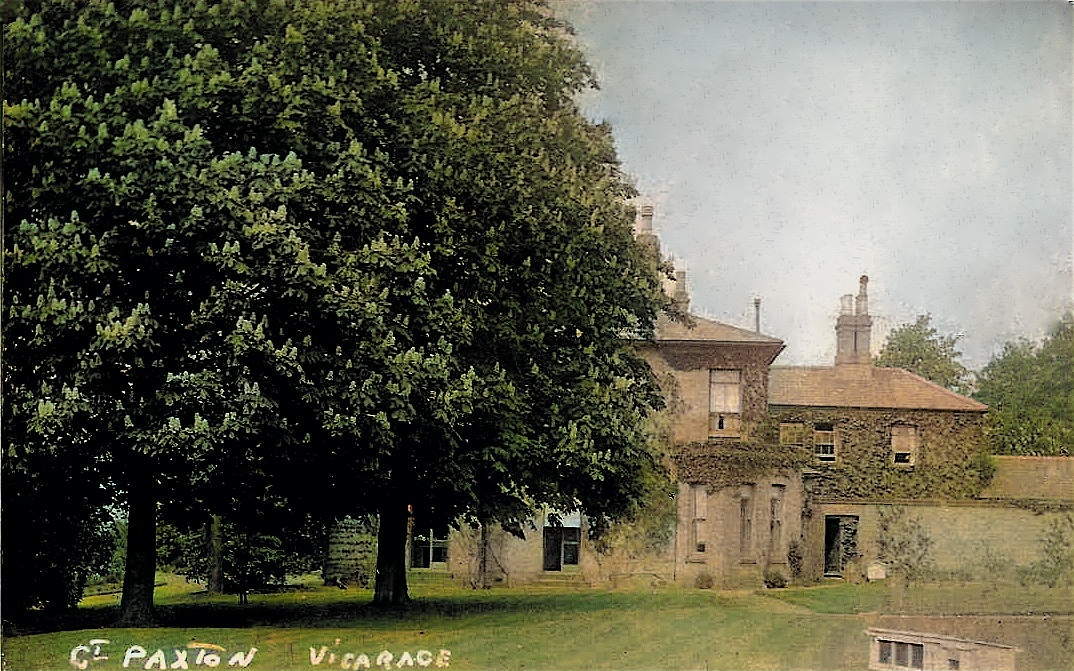 Great Paxton vicarage 1913 - colourized
Great Paxton vicarage 1913 - colourized
The youngest son, Lionel Cane served in the First World War with the Lancashire Regiment, 11th Brigade, 4th Division, he was killed in action on the 7th of November 1914 leading his men “going over the top” attacking an enemy trench. He was 29 years old and the first soldier from Great Paxton to be killed in the Great War. His great niece Sheila Cane describes him as being “an excellent and gallant Infantry Officer and much respected by his men”.
Alfred Cane sent a letter after Lionel’s death on the 26th November 1914:
Dear Sir
Messrs Cox (?) inform me that they have some effects of my son, the late Capt. Cane, East Lancs Regt. Will you please give instructions that these should be sent to me.
Yours faithfully. A.G Cane
The “effects” amounted to 2 handkerchiefs, combined knife and spoon, comb, compass, airtight pillow and case, pair of scissors, shaving brush, identity disc, penknife and a tobacco pouch. They were dispatched to Great Paxton on the 29th of November 1914.
Alfred and Emily Cane certainly knew the joys and sorrows of human life as they served the three villages in their care. Alfred was highly respected as a parish priest made very clear by the tribute to him in a local newspaper written after his death.
It reports that Alfred and Emily had been to Bath and were returning by train to Great Paxton so that Alfred could take services the next day. It is thought that he contracted flu but still worked on that Sunday. He suffered an accident after which his illness developed. He passed away on Friday February the 14th 1919 at Great Paxton Vicarage aged 74 years.
His daughter Mary (Mollie) Alford, wrote to “My Dear Coats”, who would have been Alfred’s nephew, on February the 15th , 1919:
- I sent you a wire today as it is Saturday and posts
are so bad.
Father for worse yesterday about 3pm and passed away quite peacefully at about 5 o’clock. No pain at all. He just slept away. The funeral is to be on Wednesday at 3pm. I don’t know whether you will like to come, but the train that gets into St Neots at 1.15pm would be best.
If you would like to let me know, I will see about you being met and also whether we can put you up.
Geoffrey is here and is the greatest comfort. With love to you all.
Yours affectionately
Mollie Alford.
The newspaper says that many were prevented from attending his funeral due to floods. In tribute to Rev Cane, the writer states:
During the 26 years that he has been vicar, many improvements have been affected in the parishes; the erection of the Towgood Institute, the Reredos behind the altar and the Font Cover at Great Paxton Church. The deceased gentleman carried out his duties most conscientiously and efficiently and was held in high esteem by his parishioners.
He was an excellent preacher, his sermons always being straight forward, plain and of a practical nature. He took a keen interest in the welfare of his three parishes. He was a skilled horticulturalist and angler and has carried off many prizes for fruit at local shows.
The funeral took place on Wednesday February the 19th 1919 in Great Paxton Church, the body, having been previously cremated. The burial register states him as having been buried on that day - but presumably his ashes were interred.
Representatives from all three parishes attended, including Lady Esme Gordon from Paxton Park who sent a wreath, another wreath came from parishioners, the School and Choir of Little Paxton.
When Little Paxton parish council first met in December 1894, Rev Cane was elected as its first chairman.
Alfred, Emily and family had lived in the vicarage at Great Paxton with its lovely grounds and 13 spacious rooms built in 1842 during the time of Rev Henry Nicholson (now known as Paxton Place at the Offord end of the High Street). Census records tell us that they benefitted from servants, usually a cook, parlour maid and housemaid, gardener and groom.
Alfred’s widow Emily had to leave this tied property, the sale catalogue of household items reveals how comfortably they lived. It refers to an excellent upright piano, dining, drawing and bedroom suites, a very fine mahogany sideboard, carved oak coffer, bee appliances, a 16-h. p Darracq Motor Car, an excellent pleasure boat and other numerous effects.
The cover notes that Mrs Cane was leaving the vicarage on Tuesday April 9th,1919, two months after Alfred’s funeral. She passed away in Bexhill-on-Sea in 1939 at the age of 81.
Adapted from “125 years of Vicars in the Paxtons” by Canon Annette Reed, the latest in the line of Great Paxton clergy dating back to the 12th century.
Thanks also to Sheila Cane, Alfred Cane’s great niece for information.

